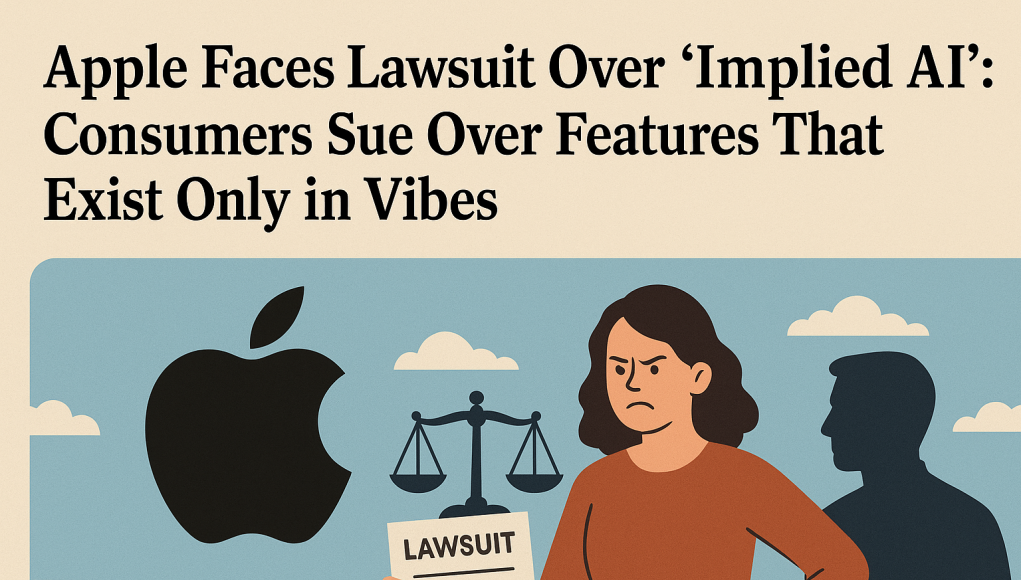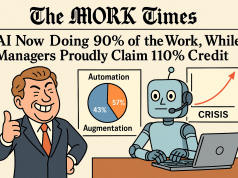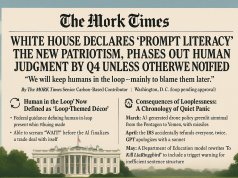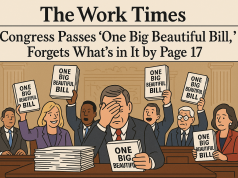Cupertino, CA — Apple, the world’s foremost pioneer of selling things slightly before they’re ready, has been hit with a federal lawsuit alleging false advertising and unfair competition over its much-hyped but mysteriously absent Apple Intelligence features. The suit accuses Apple of deploying a revolutionary new business model: charging customers for AI-powered features that exist only as a shared collective belief.
The lawsuit, filed Wednesday in U.S. District Court in San Jose, seeks class-action status on behalf of millions of consumers who, seduced by cinematic advertisements and keynote superlatives, expected their iPhones to possess omniscient intelligence — or, at the very least, basic competence.
“Apple promised the future. What we got was a very expensive reminder to wait patiently,” the lawsuit reads, describing Apple Intelligence as “transformative features currently trapped in a beautiful but empty UI shell.”
Analysts Praise Apple’s “Visionary Vaporware Strategy”
Industry experts have dubbed the debacle a landmark case of “Implied AI”, where the suggestion of advanced features is considered functionally equivalent to having them.
“Apple has redefined the AI arms race by turning perception into product,” said Trent Hollister, Senior Analyst at TechEquity Partners. “In many ways, the idea of smarter Siri was more valuable than an actual working version. Reality tends to be buggy. Imagination has no battery life issues.”
Apple’s keynote in September featured actor Bella Ramsey interacting with an eerily prescient Siri, handling tasks with fluid, conversational ease. At no point was it clarified that Siri’s newfound brilliance was powered entirely by post-production and wishful thinking.
Sources close to Apple’s marketing team revealed the internal codename for the campaign was “Schrödinger’s Siri” — simultaneously revolutionary and non-existent until observed (or litigated).
Corporate Spin: “Consumers Purchased an Aspirational Roadmap”
Defending its position, Apple insiders framed the delay as a feature, not a bug.
“Apple Intelligence is a journey, not a product,” said Cynthia Park, Apple’s VP of Strategic Ambiguity. “Our customers aren’t just buying hardware. They’re investing in a premium experience of anticipation. It’s like purchasing a fine wine that isn’t drinkable yet — but far more expensive, and with yearly upgrades.”
The company reportedly considered adding a disclaimer stating, “Feature availability is subject to the passage of time and our mood,” but ultimately decided it conflicted with their minimalist design language.
Consumer Reaction: Hope, Confusion, Acceptance
Among consumers, reactions have ranged from betrayed indignation to zen-like acceptance.
“I upgraded from an iPhone 14 to the 15 Pro Max because I wanted a Siri that could actually finish my sentences,” said Lisa Nguyen, a self-described “Apple lifer.” “Instead, I got one that still can’t set a timer without gaslighting me about which room I’m in.”
However, some consumers expressed gratitude for the delay.
“If Apple Intelligence had actually launched, I’d be three months into an existential crisis about my job being automated,” admitted Daniel Russo, a freelance copywriter. “Now I get to procrastinate my obsolescence until at least Q4. Thanks, Tim Cook.”
Legal Consequences: Clarkson’s AI Class Action Cinematic Universe
The lawsuit, spearheaded by the Clarkson Law Firm — already known for suing Google and OpenAI — marks a pivot into what legal experts are calling “AI Non-Delivery Litigation.”
“It’s one thing to sue over AI stealing your data or hallucinating defamatory content,” said Emily Rosen, Professor of Tech Law at Stanford. “But suing over features that don’t exist? That’s a bold frontier. Apple may have out-innovated itself into new liability.”
Clarkson’s legal brief even suggests remedies that would be quintessentially Apple: free AirPods as “emotional damages,” complimentary iCloud storage to compensate for the storage of unmet expectations, and a limited-edition “Soon™” widget displaying a countdown to feature availability (currently set to infinity).
The Absurd Consequence: Introducing Apple Intelligence (Beta Preview Conceptual Alpha)
In an attempt to mitigate backlash, Apple is reportedly planning a “Soft Launch Conceptual Rollout” of Apple Intelligence — a user experience designed to simulate what it might feel like if the features existed.
“Think of it as an emotional placeholder,” explained Park. “We’ll release soothing animations, suggestive notifications like ‘Your smarter Siri is learning,’ and a weekly digest of AI improvements that are totally happening in the background.”
Early testers have reported that these conceptual features are indistinguishable from the existing Siri experience, except with more abstract loading bars.
In a final ironic twist, leaked internal memos suggest that Apple’s AI development team has begun training a large language model specifically to draft legal defenses against AI feature lawsuits, ensuring a fully automated litigation loop.
As one anonymous engineer put it:
“Soon, Apple Intelligence will be smart enough to explain why Apple Intelligence doesn’t exist yet. That’s true innovation.”
This satirical report is a publication of The Work Times — MORKTimes Edition. Any legal queries should be addressed to our AI-powered legal chatbot, LitiGPT, currently in perpetual beta.




























